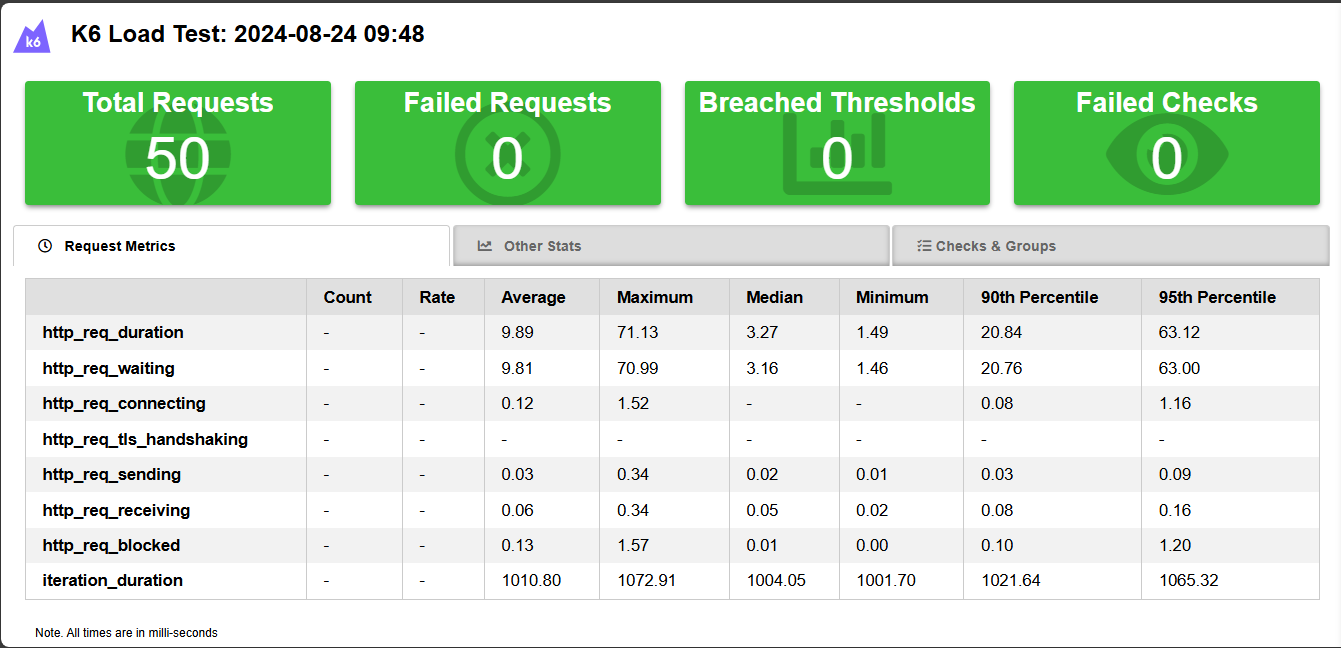Deploy Performance Testing with Grafana (k6)
1. Install the Tool
You can refer to the installation guide here: Install k6 | Grafana k6 documentation
We will install k6 on the Build Instance.
sudo gpg -k
sudo gpg --no-default-keyring --keyring /usr/share/keyrings/k6-archive-keyring.gpg --keyserver hkp://keyserver.ubuntu.com:80 --recv-keys C5AD17C747E3415A3642D57D77C6C491D6AC1D69
echo "deb [signed-by=/usr/share/keyrings/k6-archive-keyring.gpg] https://dl.k6.io/deb stable main" | sudo tee /etc/apt/sources.list.d/k6.list
sudo apt-get update
sudo apt-get install k6
k6 --version
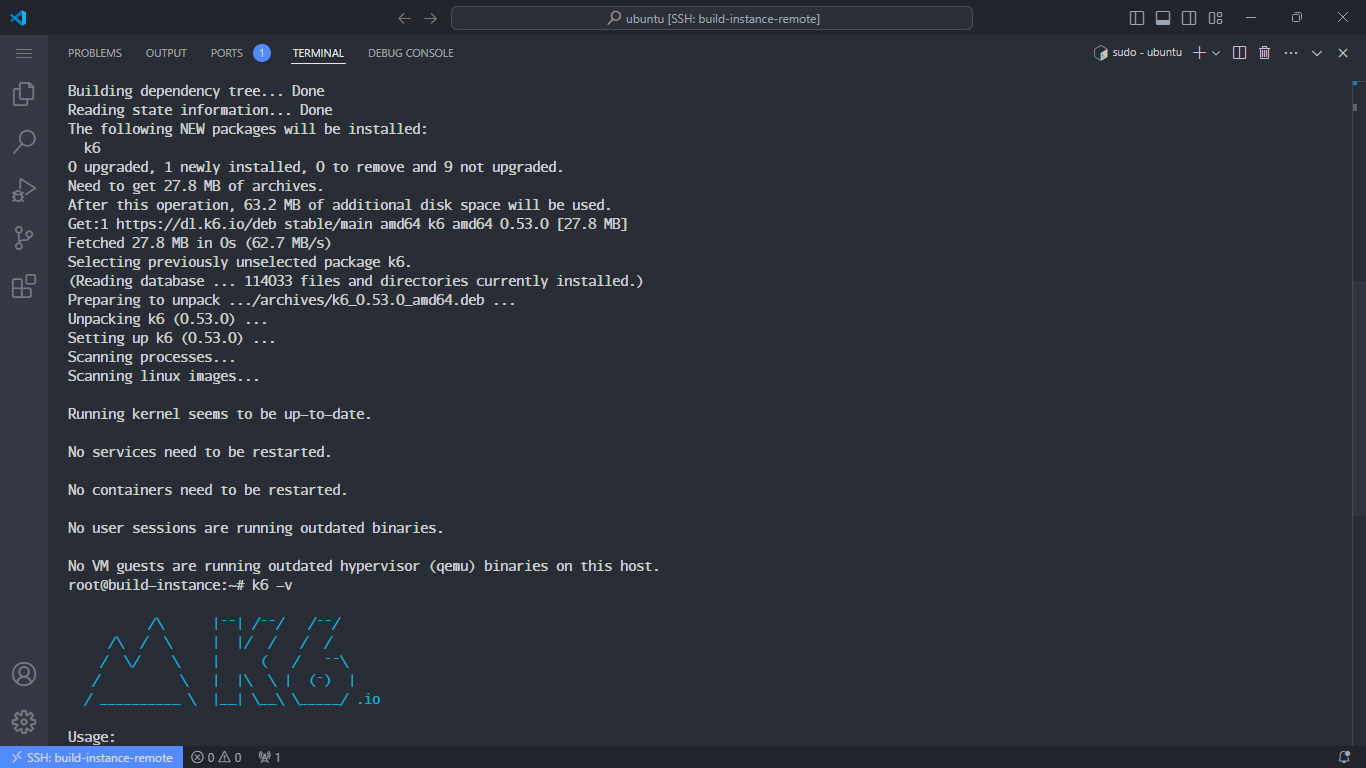
2. Create a Working Directory and Script
In the previous sections, we have two projects, frontend and backend, running.
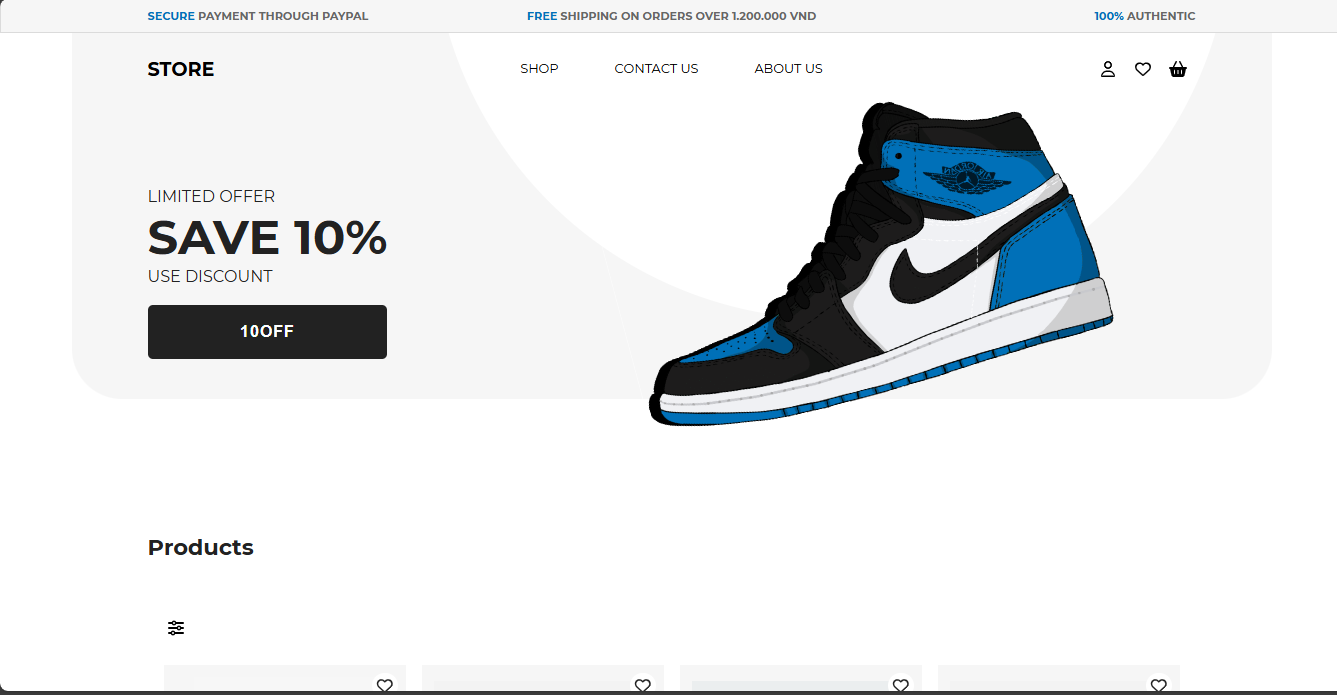
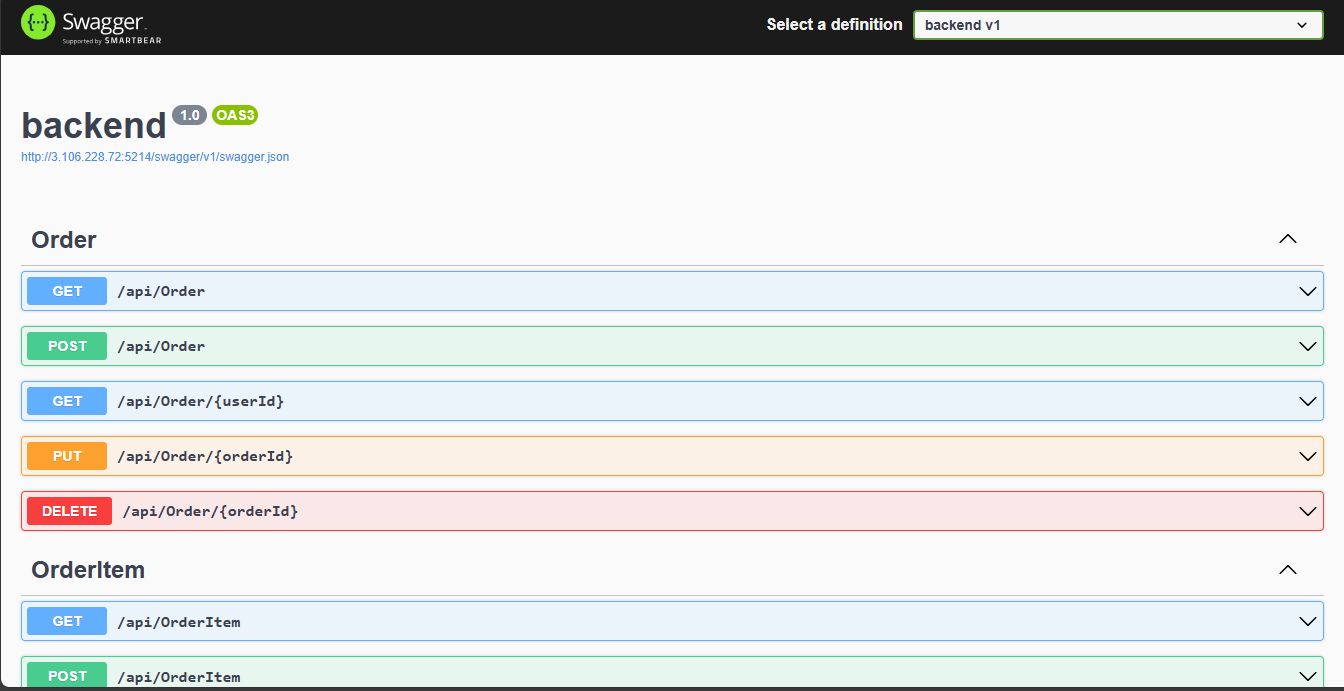
We will create a working directory and a load-test.js file to perform performance testing on these two projects.
mkdir -p tools/test-k6 && cd tools/test-k6 && vi load-test.js
For example, we will create a script that simulates 100 concurrent users accessing the website for 20 seconds, with 95% of HTTP requests completing in under 500ms.
Enter the following command:
import http from 'k6/http';
import {check, sleep} from 'k6';
export let options = {
vus: 100,
duration: '10s',
thresholds: {
http_req_duration: ['p(95)<500']
}
}
export default function () {
let res = http.get('http://3.106.228.72:3000/');
check(res, {'status was 200': (r) => r.status === 200});
sleep(1);
}
You must adjust the IPv4 address of your running frontend project.
Run k6 to simulate the scenario
k6 run load-test.js
Here are the results returned:
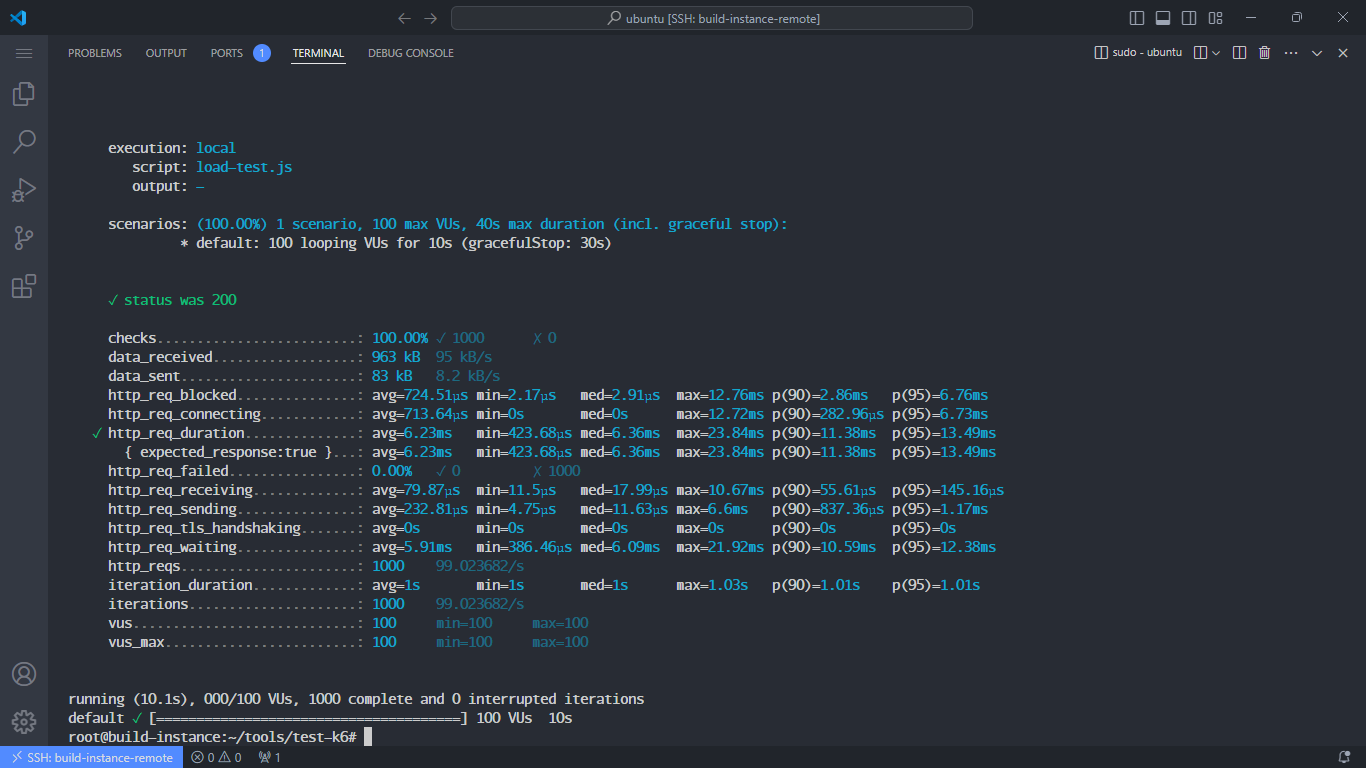
Explanation:
Overview:
- checks: Shows the percentage of successful checks and the total number of checks performed. (
100.00% ✓ 1000means all 1000 checks were successful). - data_received: Total amount of data received during the test (
963 kBwith a rate of95 kB/s). - data_sent: Total amount of data sent during the test (
83 kBwith a rate of8.2 kB/s).
HTTP Request Metrics:
- http_req_blocked: Time the HTTP request was blocked before it was actually sent.
avg=724.51µs: Average time requests were blocked before being sent.min=2.17µs: Shortest time requests were blocked.med=2.91µs: Median time requests were blocked.max=12.76ms: Longest time requests were blocked.p(90)=2.86ms: 90% of requests were blocked for this duration or less.p(95)=6.76ms: 95% of requests were blocked for this duration or less.
- http_req_connecting: Time spent establishing a TCP connection to the server.
avg=713.64µs: Average time spent connecting to the server.min=0s: Shortest connection time.med=0s: Median connection time.max=12.72ms: Longest connection time.p(90)=282.96µs: 90% of connection times were this duration or less.p(95)=6.73ms: 95% of connection times were this duration or less.
- http_req_duration: Time to complete an HTTP request, including sending, receiving, and waiting.
avg=6.23ms: Average time for a request.min=423.68µs: Shortest request duration.med=6.36ms: Median time to complete a request.max=23.84ms: Longest request duration.p(90)=11.38ms: 90% of requests completed within this duration or less.p(95)=13.49ms: 95% of requests completed within this duration or less.
- http_req_failed: Failure rate of requests, here
0.00%, meaning no requests failed. - http_req_receiving: Time to receive a response from the server.
avg=79.87µs: Average time to receive a response.min=11.5µs: Shortest response time.med=17.99µs: Median response time.max=10.67ms: Longest response time.p(90)=55.61µs: 90% of responses received within this duration or less.p(95)=145.16µs: 95% of responses received within this duration or less.
- http_req_sending:
avg=232.81µs: Average time needed to send a request to the server.min=4.75µs: Shortest time to send a request.med=11.63µs: Median time to send a request.max=6.6ms: Longest time to send a request.p(90)=837.36µs: 90% of requests sent within this duration or less.p(95)=1.17ms: 95% of requests sent within this duration or less.
- http_req_tls_handshaking: Time spent on TLS handshake, here
0s, meaning no TLS handshake occurred since we haven’t registered a certificate for http. - http_req_waiting: Time waiting for a server response after sending a request.
avg=5.91ms: Average wait time.min=386.46µs: Shortest wait time.med=6.09ms: Median wait time.max=21.92ms: Longest wait time.p(90)=10.59ms: 90% of waits were within this duration or less.p(95)=12.38ms: 95% of waits were within this duration or less.
Other Metrics:
- http_reqs: Total number of HTTP requests made, here
1000with a rate of99.023682/s. - iteration_duration: Average time to complete one iteration of a test script.
avg=1s: Average time for each iteration.med=1s: Median time for each iteration.max=1.03s: Longest time for each iteration.p(90)=1.01s: 90% of iterations completed within this duration or less.p(95)=1.01s: 95% of iterations completed within this duration or less.
- iterations: Number of test iterations, also
1000. - vus: Number of virtual users, here
100. - vus_max: Maximum number of virtual users used, also
100.
Conclusion:
- Overall Performance: The system handles HTTP requests quickly and consistently with very low response times. No requests failed, indicating good system performance under load.
- Scalability: With 100 virtual users and 1000 requests, the system appears to handle this load without significant issues. Further testing with higher loads is needed to assess scalability better.
- Response and Processing Times: All requests are processed with very good response times, indicating the system can respond quickly even under load.
Next, we will create a login-test.js file to test the performance of the backend.
vi login-test.js
Enter the following command:
import http from 'k6/http';
import {sleep} from 'k6';
export default function () {
const url = "http://3.106.228.72:5214/api/User/login";
const payload = JSON.stringify({
email: "elroydevops@gmail.com",
password: "0900000009"
});
const headers = {
'Content-Type': 'application/json'
};
const res = http.post(url, payload, {headers});
if (res.status === 200 || res.status === 201) {
console.log('Signin successfully!');
} else {
console.error('Signin fail. Error code:', res.status);
}
sleep(1);
}
Run the command k6
k6 run -u 100 -d 20s login-test.js
If you encounter a 100% failure rate, you may want to check if your Build Instance is able to connect to the backend in the Deploy Instance.

Results:
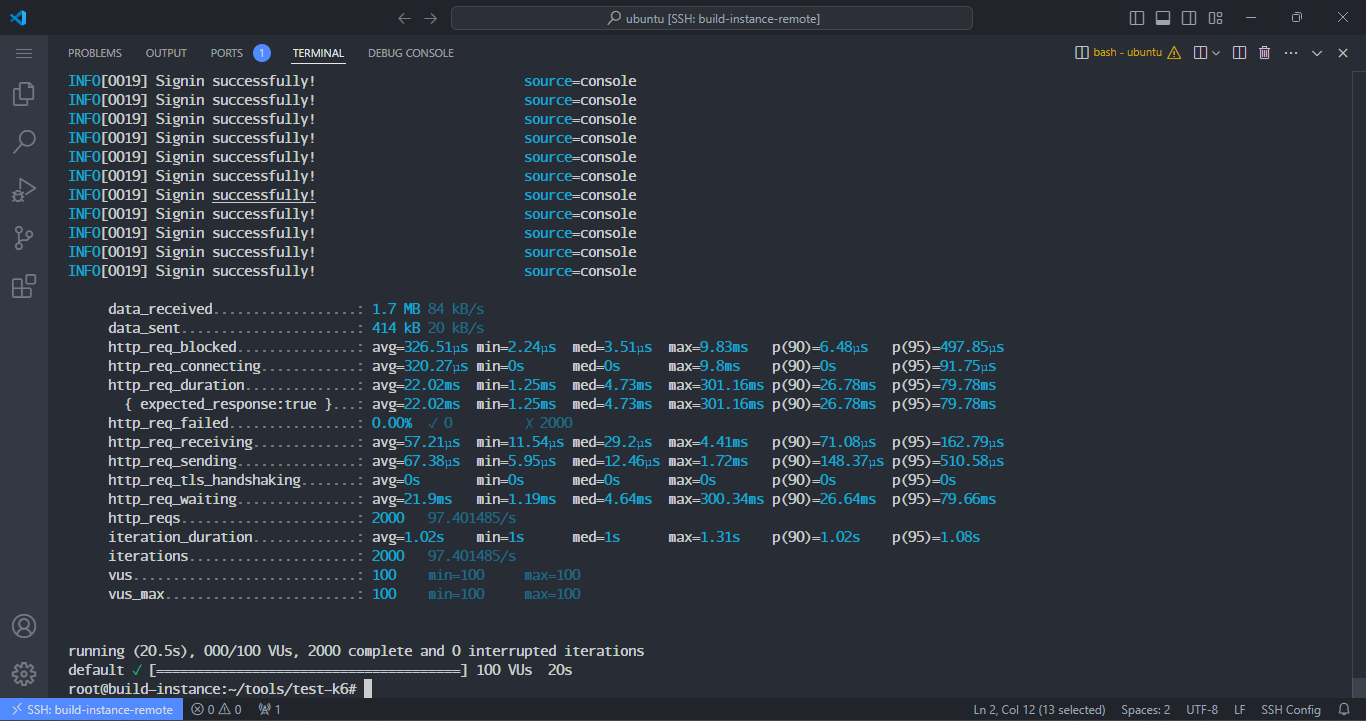
Now we will test with a script where the number of users will change irregularly.
vi spike-test.js
Enter the following commands:
import http from 'k6/http';
import { sleep, check } from 'k6';
export let options = {
stages: [
{duration: '1m', target: 50},
{duration: '10s', target: 500},
{duration: '40s', target: 50},
{duration: '20s', target: 10},
]
};
export default function () {
const res = http.get('http://3.106.228.72:3000/');
check(res, {'status is 200': (r) => r.status ===200});
sleep(1);
}
Run the simulation:
k6 run spike-test.js
View the results. For the first minute, there will be 50 users, then for the next 10 seconds, it will spike to 500 users, then drop back to 50 users for the next 40 seconds, and finally reduce to 10 users in the last 20 seconds.
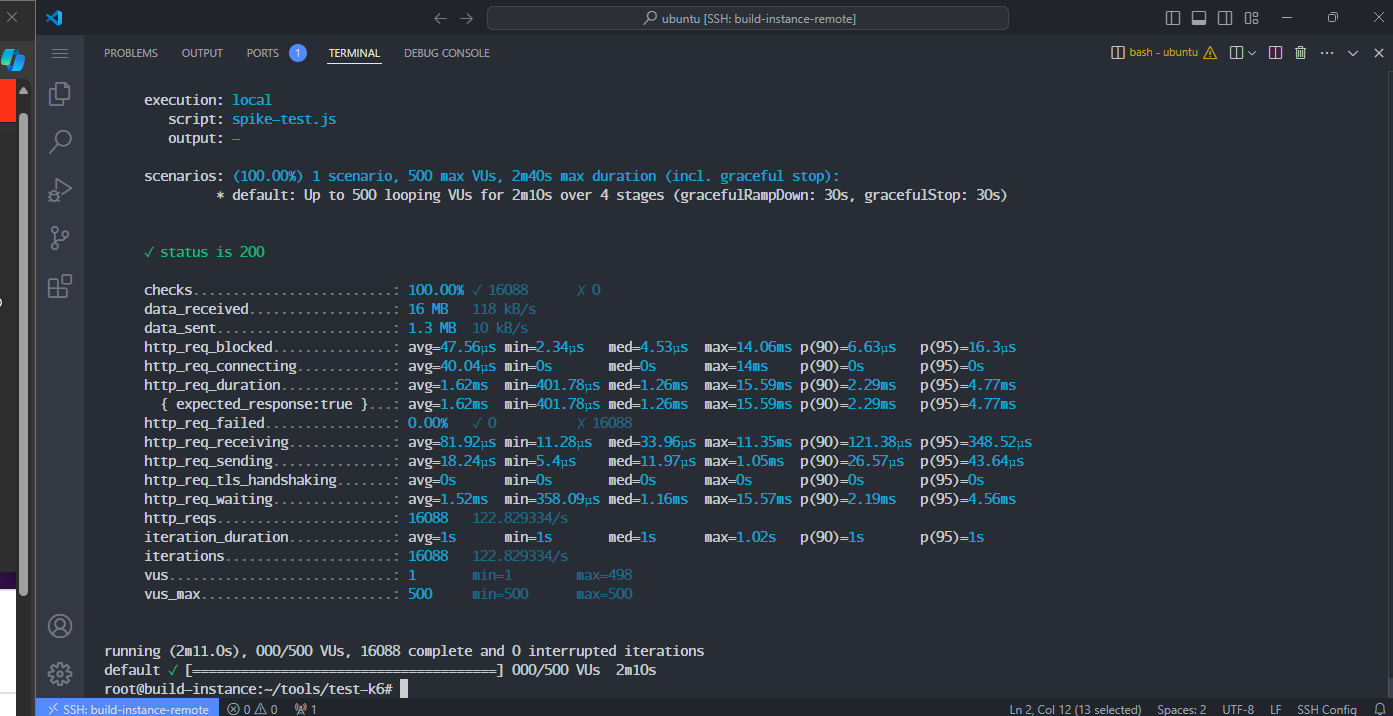
3. Implementing Performance Testing in Frontend
First, we will create a new branch pipeline-fe-11.1-k6 from the main branch.
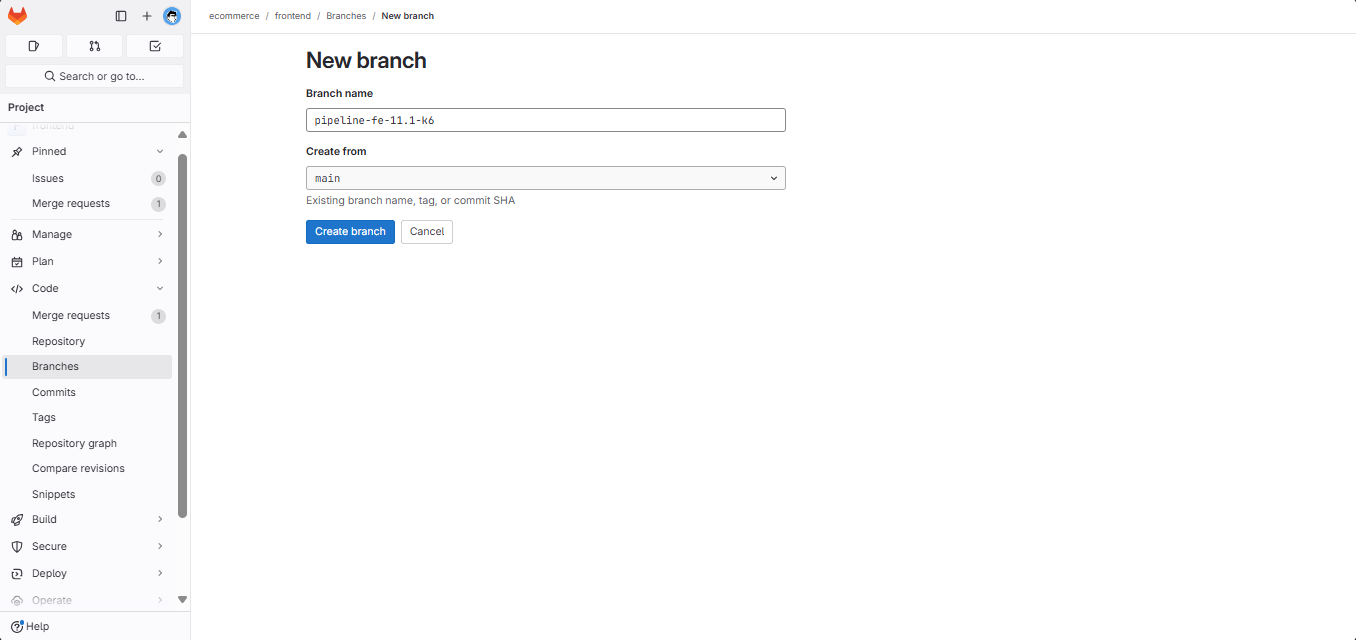
We will create a new folder.
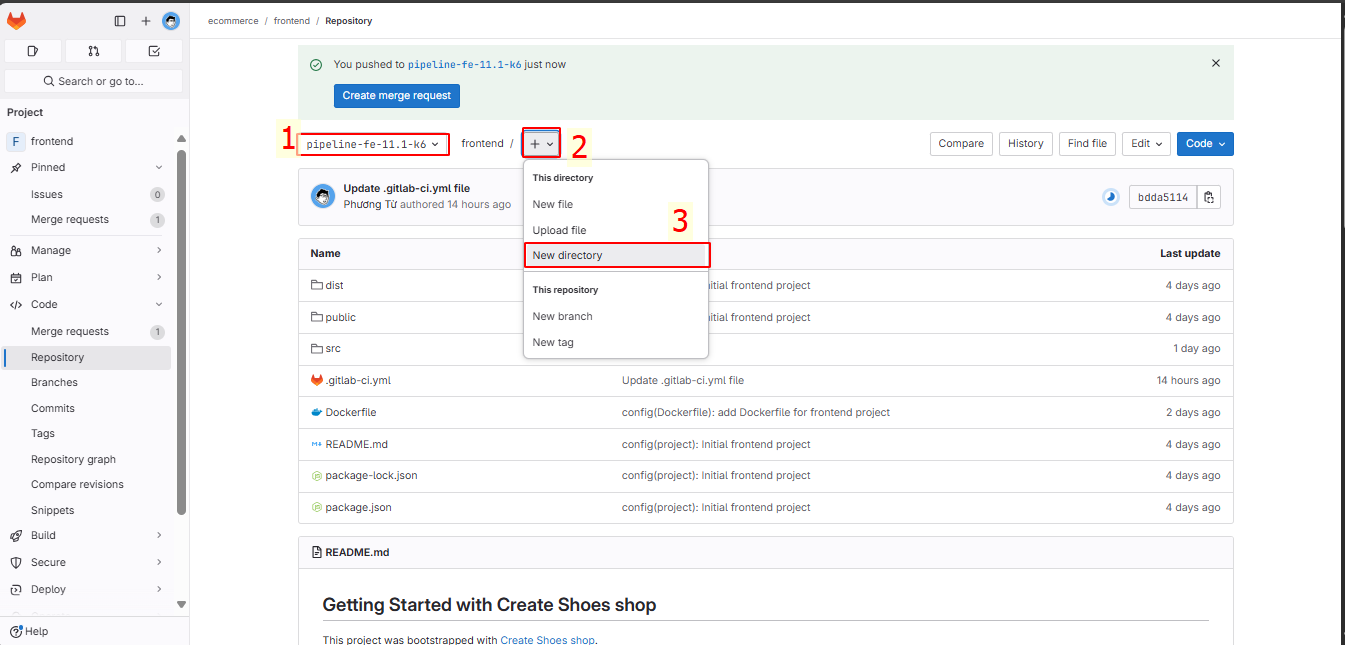
Name the folder performance_test_script.
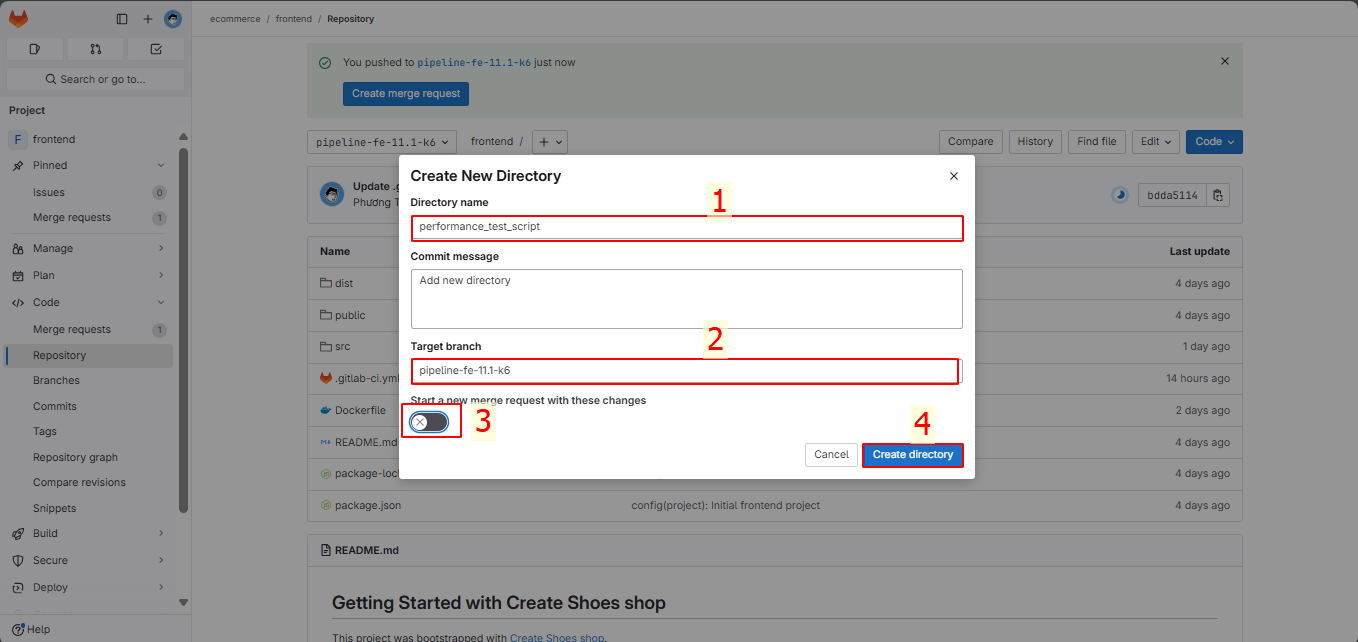
Click into the newly created folder.
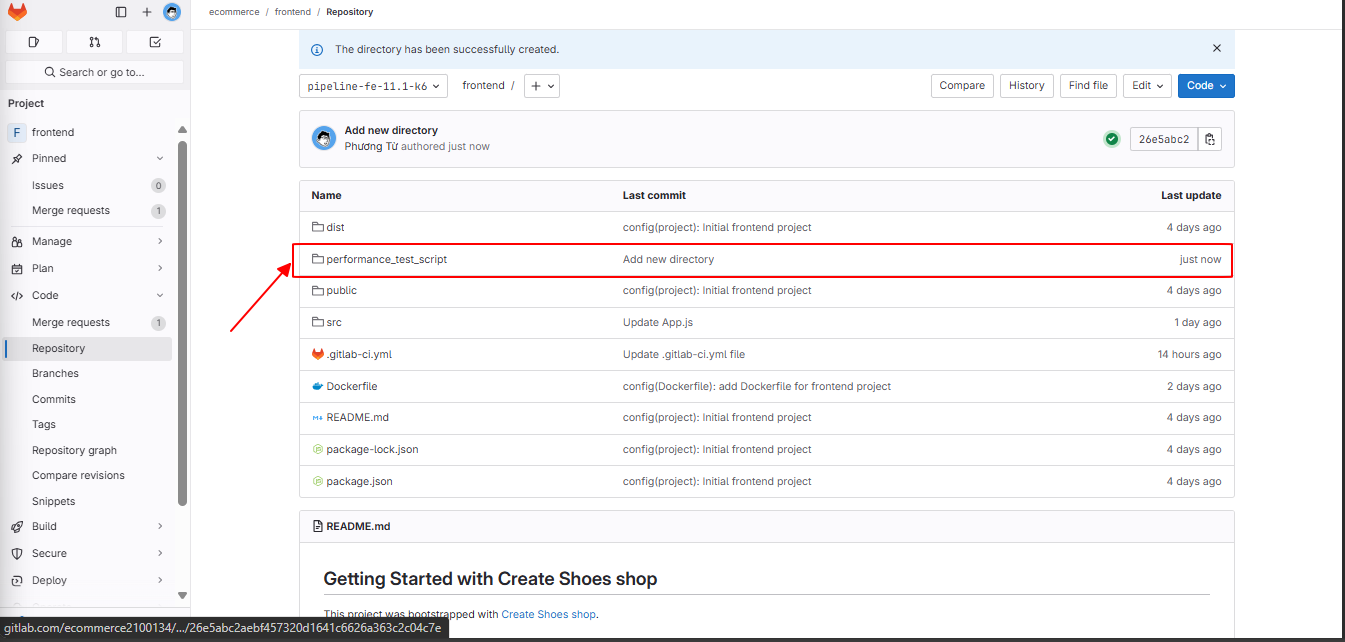
Create a new file in the folder.
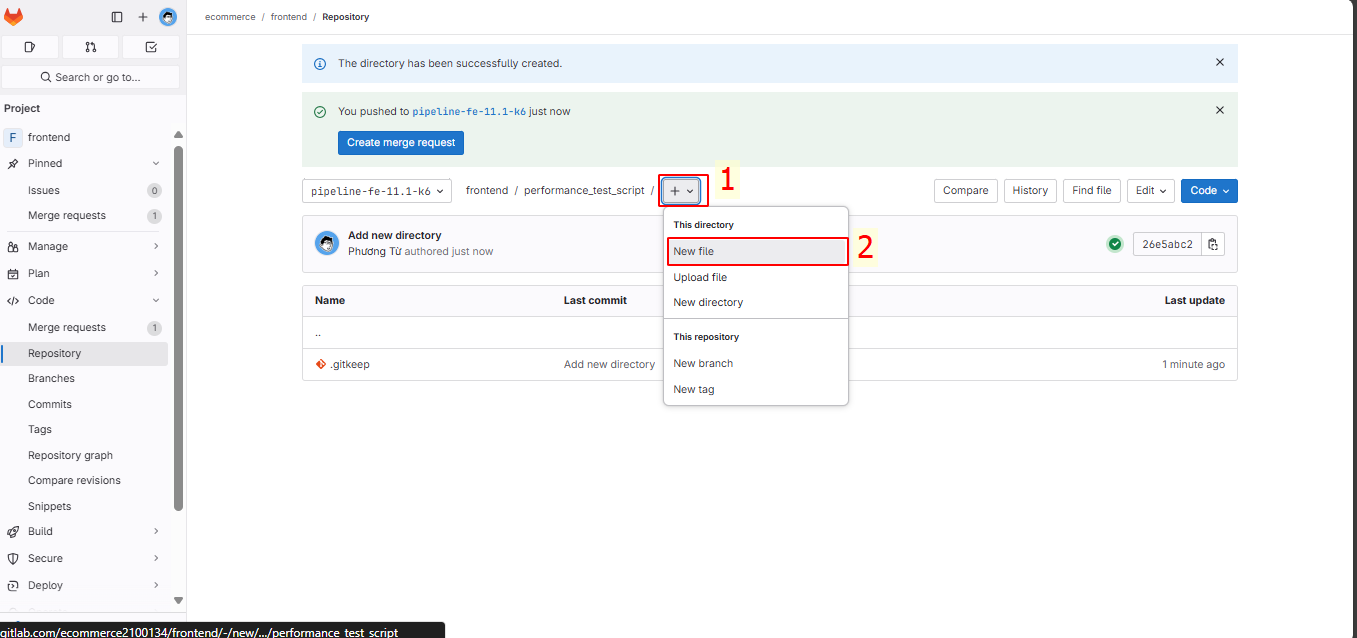
Name the file smoke-test.js and enter the following commands:
import http from 'k6/http';
import {check, sleep} from 'k6';
export let options = {
vus: 1,
duration: '10s'
};
export default function () {
const res = http.get('http://3.106.228.72:3000/');
check(res, {'status is 200': (r) => r.status ===200});
}
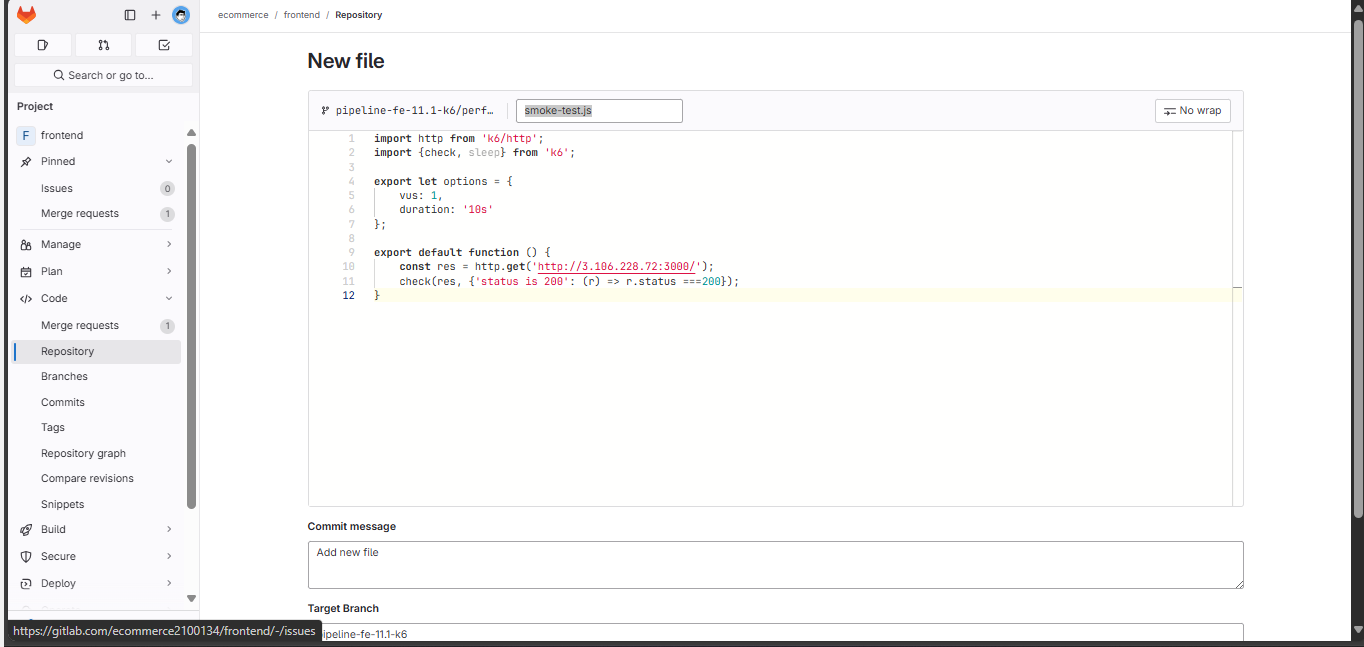
We will simulate a test script with a low number of users, called smoke-test, to check the feasibility of the deployment process. During the pre-production phase, server resources will be limited, so using smoke-test in CI/CD is appropriate.
Go to the pipeline editor to make modifications.
variables:
USER_PROJECT: "ecommerce"
PATH_PROJECT: "/home/${USER_PROJECT}/${CI_PROJECT_NAME}"
IMAGE_VERSION: "${CI_REGISTRY_USER}/${CI_PROJECT_NAME}-${USER_PROJECT}:${CI_COMMIT_REF_NAME}_${CI_COMMIT_SHORT_SHA}"
K6_PERFORMANCE_TEST_REPORT: "performance_test_${CI_PROJECT_NAME}_${CI_COMMIT_REF_NAME}_${CI_COMMIT_SHORT_SHA}_report"
stages:
- clone
- SAST
- SCA
- build
- push registry
- image scan
- deploy
- performance test
before_script:
- sudo mkdir -p $PATH_PROJECT
clone repository:
stage: clone
script:
- echo "Repository cloned."
tags:
- group-ecommerce-shell-runner-build
build:
stage: build
variables:
GIT_STRATEGY: clone
before_script:
- sudo docker login -u $CI_REGISTRY_USER -p $CI_REGISTRY_PWD
script:
- sudo docker build -t $IMAGE_VERSION .
after_script:
- sudo docker logout
tags:
- group-ecommerce-shell-runner-build
when: manual
only:
- tags
dockerhub pushing:
stage: push registry
variables:
GIT_STRATEGY: none
before_script:
- sudo docker login -u $CI_REGISTRY_USER -p $CI_REGISTRY_PWD
script:
- sudo docker push $IMAGE_VERSION
after_script:
- sudo docker logout
tags:
- group-ecommerce-shell-runner-build
needs:
- job: build
only:
- tags
deploy:
stage: deploy
variables:
GIT_STRATEGY: none
before_script:
- sudo docker login -u $CI_REGISTRY_USER -p $CI_REGISTRY_PWD
script:
- sudo docker pull $IMAGE_VERSION
- sudo su ${USER_PROJECT} -c "
container_exists=\$(sudo docker ps -a -q -f name=${CI_PROJECT_NAME});
if [ ! -z \"\$container_exists\" ]; then
sudo docker rm -f ${CI_PROJECT_NAME};
fi;
sudo docker run --name ${CI_PROJECT_NAME} -dp ${FRONTEND_PORT}:80 ${IMAGE_VERSION}"
after_script:
- sudo docker logout
tags:
- group-ecommerce-shell-runner
when: manual
only:
- tags
k6 testing performance:
stage: performance test
variables:
GIT_STRATEGY: clone
script:
- echo "$(pwd)"
- |
if ! command -v jq &> /dev/null; then
echo "jq is not installed. Installing jq..."
sudo apt-get update -y && sudo apt-get install -y jq
else
echo "jq is already installed"
fi
- chmod -R 777 ./performance_test_script/
- docker run --rm -v $(pwd)/performance_test_script:/performance_test_script loadimpact/k6 run -e RESULTS_PATH=/performance_test_script --summary-export=/performance_test_script/summary_perf.json /performance_test_script/smoke-test.js
- cat ./performance_test_script/summary_perf.json | jq -r '["metric", "avg", "min", "med", "max", "p(90)", "p(95)"], (.metrics | to_entries[] | [.key, .value.avg, .value.min, .value.med, .value.max, .value["p(90)"], .value["p(95)"]]) | @csv' > $K6_PERFORMANCE_TEST_REPORT.csv
after_script:
- sudo chown -R gitlab-runner $(pwd)
tags:
- group-ecommerce-shell-runner-build
only:
- tags
artifacts:
paths:
- $K6_PERFORMANCE_TEST_REPORT.csv
expire_in: 1 day
We create tags and view the pipeline results.
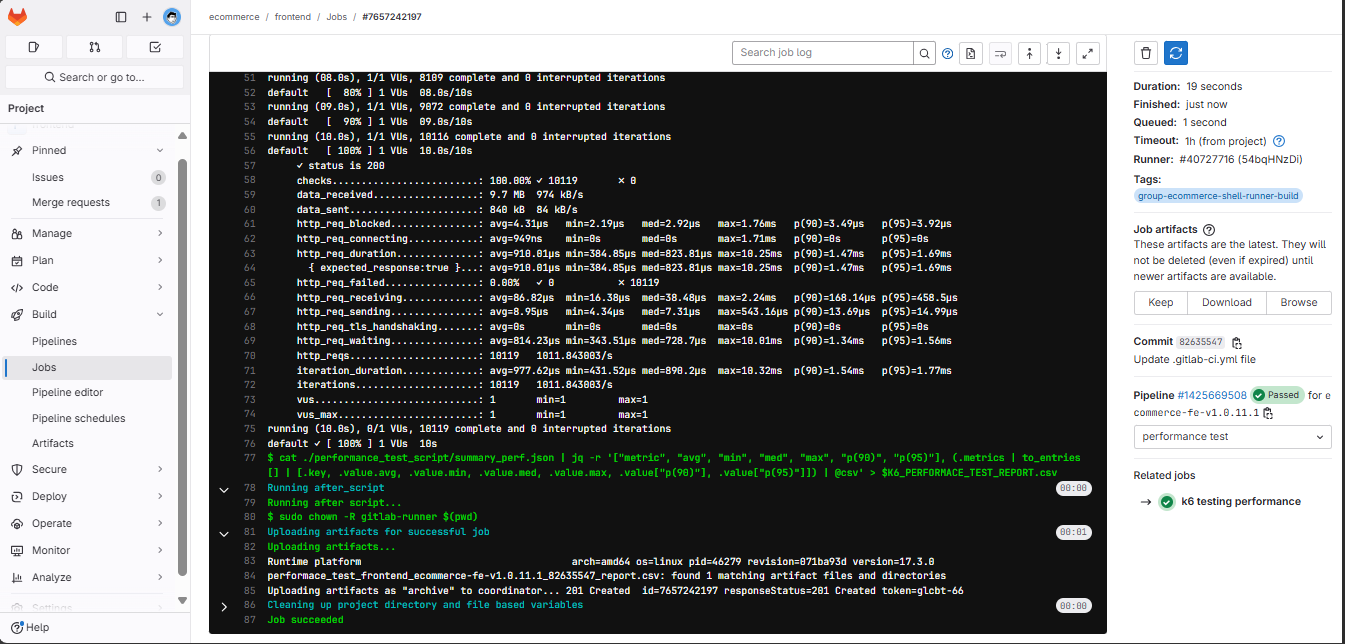
Here is the result of the .csv file.
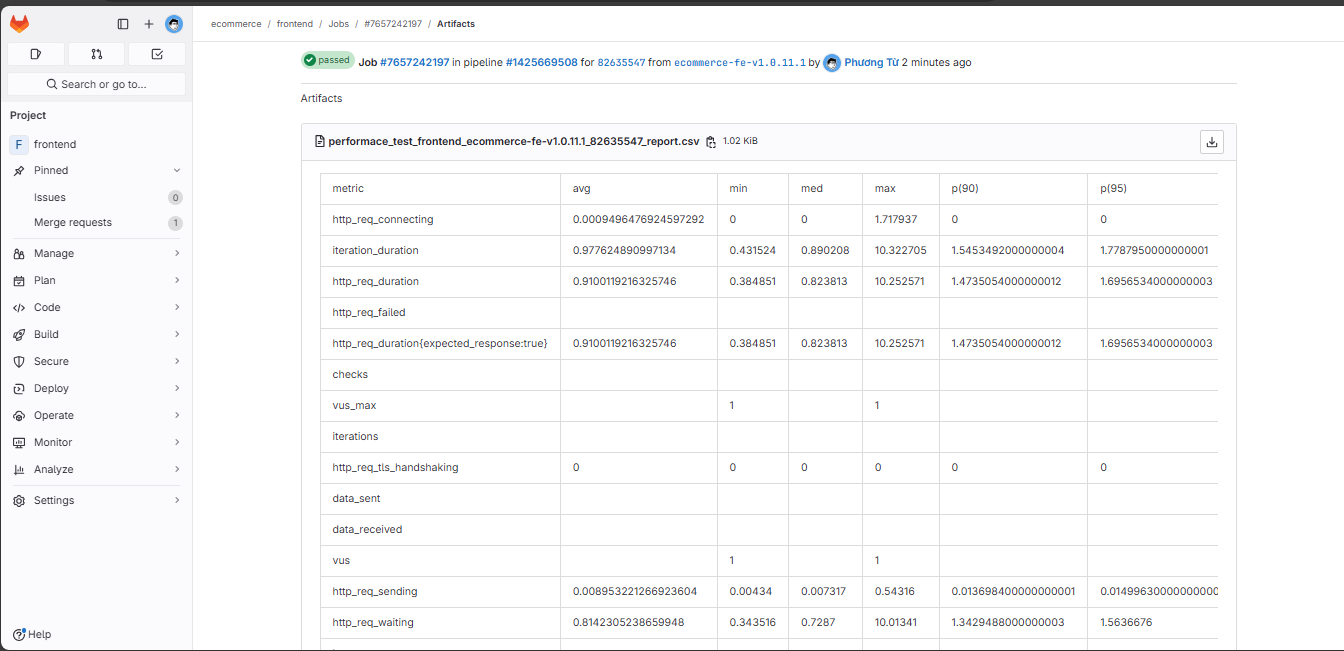
Now we will convert the CSV file to HTML. We will do this in a new branch named pipeline-fe-11.1-k6-v2 from pipeline-fe-11.1-k6.
You can refer to: benc-uk/k6-reporter: Output K6 test run results as formatted & easy to read HTML reports (github.com)
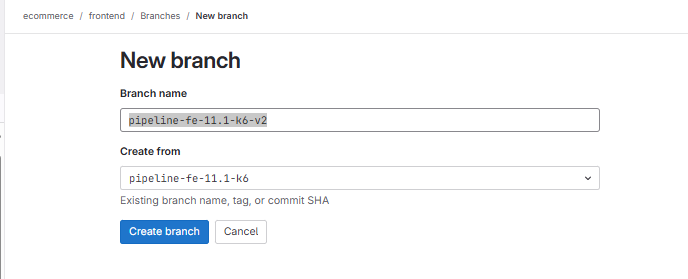
Modify the file performance_test_script/smoke-test.js
import http from 'k6/http';
import { check, sleep } from 'k6';
import { htmlReport } from "https://raw.githubusercontent.com/benc-uk/k6-reporter/main/dist/bundle.js";
export let options = {
vus: 1,
duration: '10s',
};
export default function () {
const BASE_URL = 'http://3.106.228.72:3000/';
let res = http.get(BASE_URL);
check(res, {
'homepage status is 200': (r) => r.status === 200,
});
sleep(1);
}
export function handleSummary(data) {
return {
"/performance_test_script/summary.html": htmlReport(data),
};
}
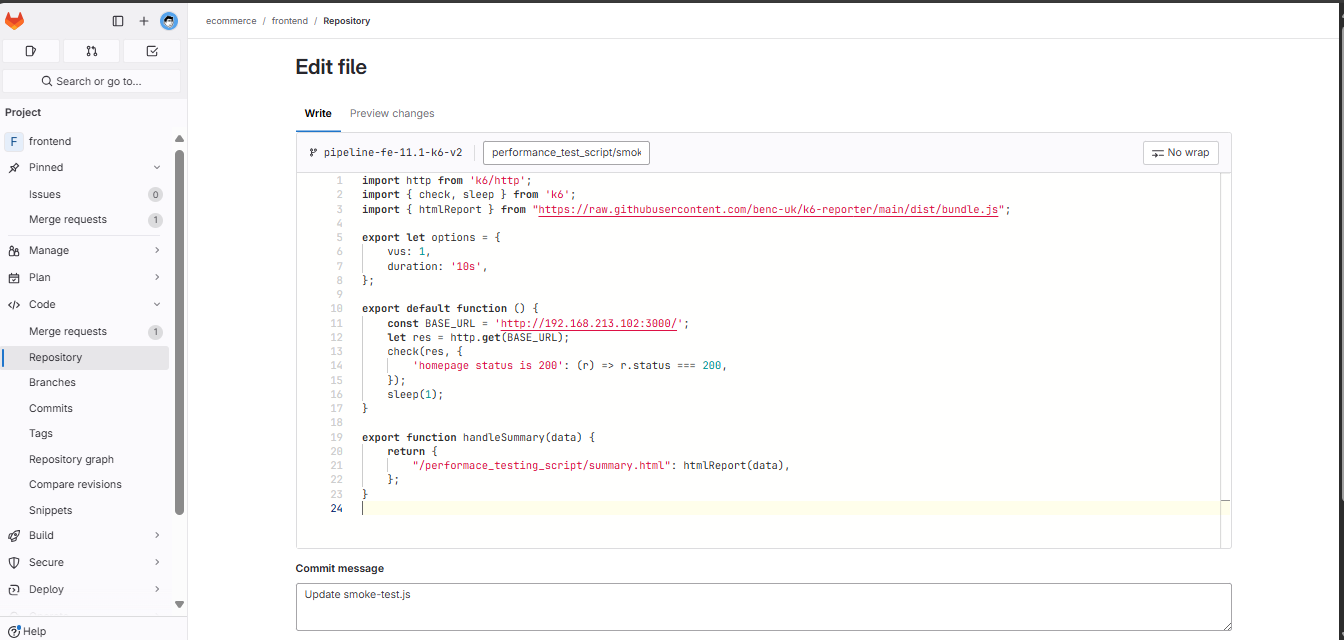
Modify the gitlab-ci.yml file
variables:
USER_PROJECT: "ecommerce"
PATH_PROJECT: "/home/${USER_PROJECT}/${CI_PROJECT_NAME}"
IMAGE_VERSION: "${CI_REGISTRY_USER}/${CI_PROJECT_NAME}-${USER_PROJECT}:${CI_COMMIT_REF_NAME}_${CI_COMMIT_SHORT_SHA}"
K6_PERFORMANCE_TEST_REPORT: "performance_test_${CI_PROJECT_NAME}_${CI_COMMIT_REF_NAME}_${CI_COMMIT_SHORT_SHA}_report"
stages:
- clone
- SAST
- SCA
- build
- push registry
- image scan
- deploy
- performance test
before_script:
- sudo mkdir -p $PATH_PROJECT
clone repository:
stage: clone
script:
- echo "Repository cloned."
tags:
- group-ecommerce-shell-runner-build
build:
stage: build
variables:
GIT_STRATEGY: clone
before_script:
- sudo docker login -u $CI_REGISTRY_USER -p $CI_REGISTRY_PWD
script:
- sudo docker build -t $IMAGE_VERSION .
after_script:
- sudo docker logout
tags:
- group-ecommerce-shell-runner-build
when: manual
only:
- tags
dockerhub pushing:
stage: push registry
variables:
GIT_STRATEGY: none
before_script:
- sudo docker login -u $CI_REGISTRY_USER -p $CI_REGISTRY_PWD
script:
- sudo docker push $IMAGE_VERSION
after_script:
- sudo docker logout
tags:
- group-ecommerce-shell-runner-build
needs:
- job: build
only:
- tags
deploy:
stage: deploy
variables:
GIT_STRATEGY: none
before_script:
- sudo docker login -u $CI_REGISTRY_USER -p $CI_REGISTRY_PWD
script:
- sudo docker pull $IMAGE_VERSION
- sudo su ${USER_PROJECT} -c "
container_exists=\$(sudo docker ps -a -q -f name=${CI_PROJECT_NAME});
if [ ! -z \"\$container_exists\" ]; then
sudo docker rm -f ${CI_PROJECT_NAME};
fi;
sudo docker run --name ${CI_PROJECT_NAME} -dp ${FRONTEND_PORT}:80 ${IMAGE_VERSION}"
after_script:
- sudo docker logout
tags:
- group-ecommerce-shell-runner
when: manual
only:
- tags
k6 testing performance:
stage: performance test
variables:
GIT_STRATEGY: clone
script:
- echo "$(pwd)"
- chmod -R 777 ./performance_test_script/
- docker run --rm -v $(pwd)/performance_test_script:/performance_test_script loadimpact/k6 run -e RESULTS_PATH=/performance_test_script --summary-export=/performance_test_script/summary_perf.json /performance_test_script/smoke-test.js
- mv ./performance_test_script/summary.html $(pwd)/$K6_PERFORMANCE_TEST_REPORT.html
- sudo chown -R gitlab-runner $(pwd)
tags:
- group-ecommerce-shell-runner-build
only:
- tags
artifacts:
paths:
- $K6_PERFORMANCE_TEST_REPORT.html
expire_in: 1 day
Successful run results.
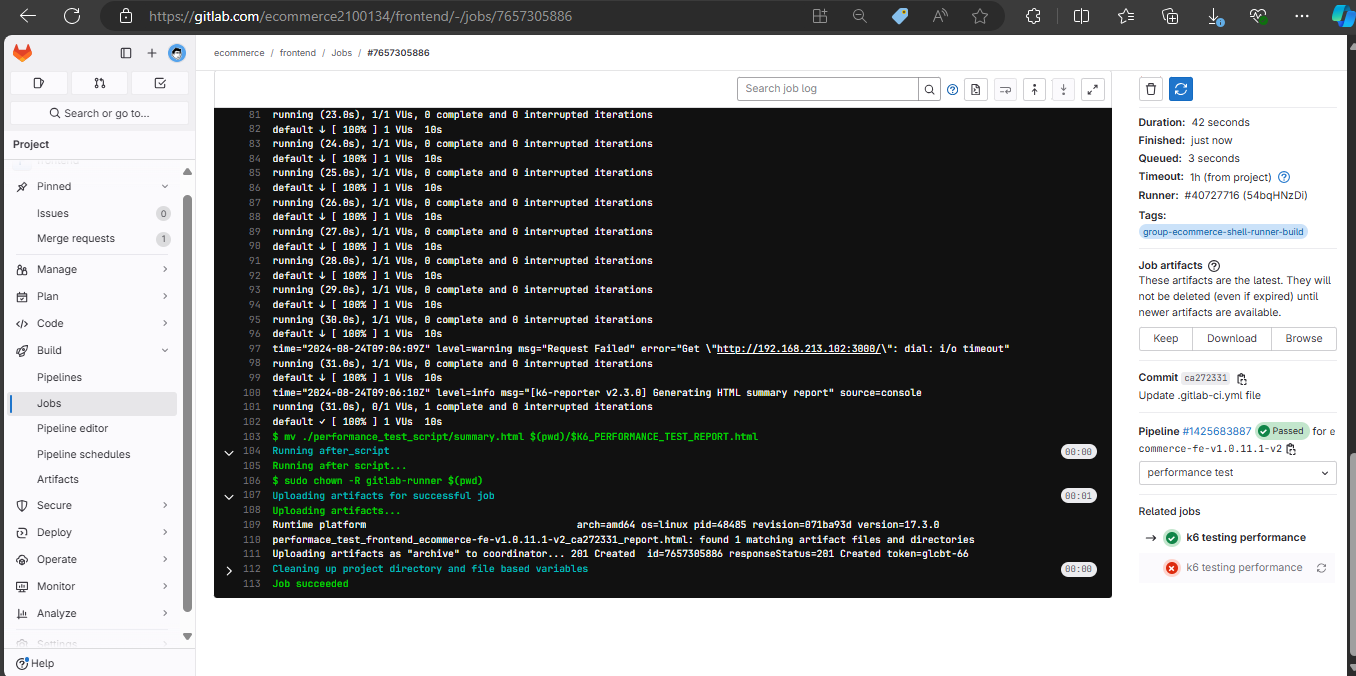
The HTML file is more dynamic and visual.
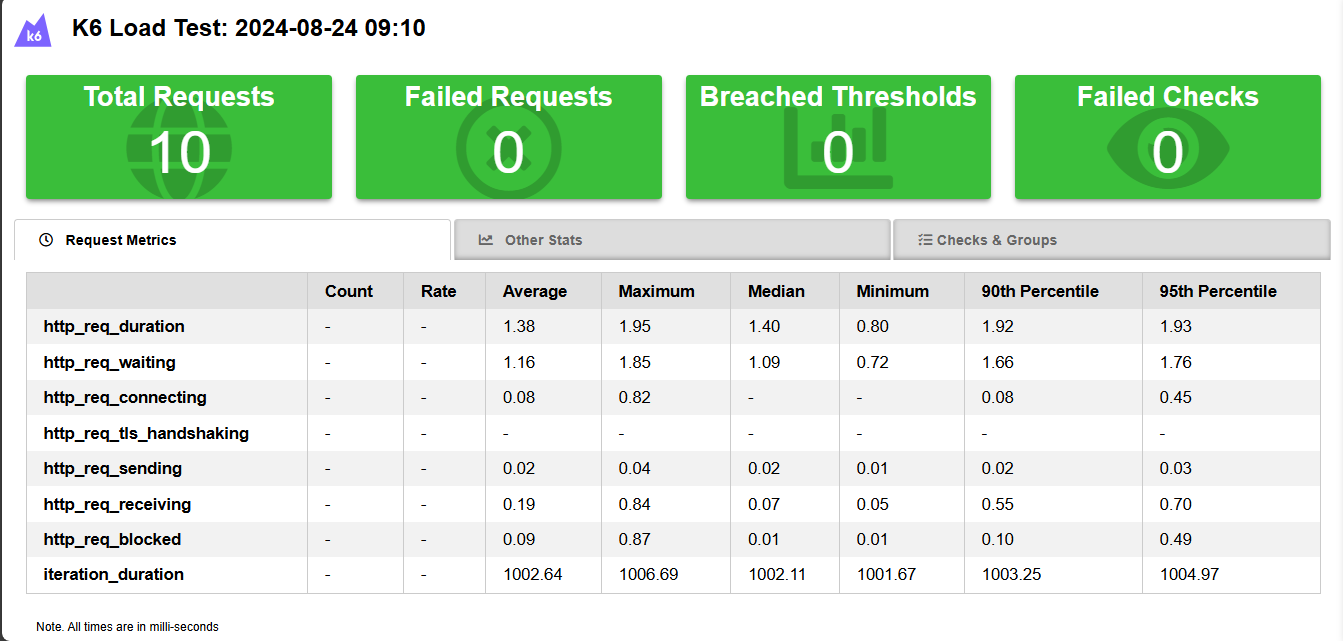
4. Implementing Performance Testing in Backend
First, we will create a new branch pipeline-be-11.1-k6 from the main branch.
We will create a new folder named performance_test_script and create a new file in the folder named login-test.js.
Enter the following commands:
import http from 'k6/http';
import {sleep} from 'k6';
import { htmlReport } from "https://raw.githubusercontent.com/benc-uk/k6-reporter/main/dist/bundle.js";
export default function () {
const url = "http://3.106.228.72:5214/api/User/login";
const payload = JSON.stringify({
email: "elroydevops@gmail.com",
password: "0900000009"
});
const headers = {
'Content-Type': 'application/json'
};
const res = http.post(url, payload, {headers});
if (res.status === 200 || res.status === 201) {
console.log('Signin successfully!');
} else {
console.error('Signin fail. Error code:', res.status);
}
sleep(1);
}
export function handleSummary(data) {
return {
"/performance_test_script/summary.html": htmlReport(data),
};
}
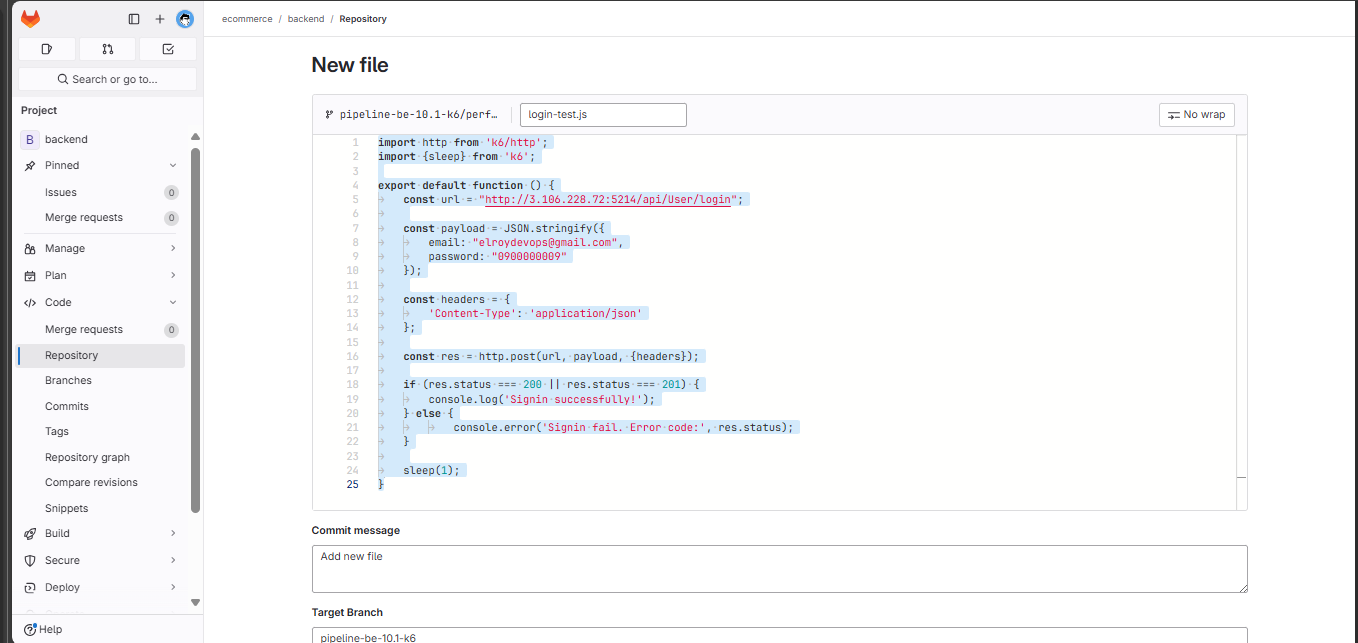
Go to the pipeline editor to make modifications.
variables:
USER_PROJECT: "ecommerce"
PATH_PROJECT: "/home/${USER_PROJECT}/${CI_PROJECT_NAME}"
IMAGE_VERSION: "${CI_REGISTRY_USER}/${CI_PROJECT_NAME}-${USER_PROJECT}:${CI_COMMIT_REF_NAME}_${CI_COMMIT_SHORT_SHA}"
K6_PERFORMANCE_TEST_REPORT: "performance_test_${CI_PROJECT_NAME}_${CI_COMMIT_REF_NAME}_${CI_COMMIT_SHORT_SHA}_report"
stages:
- clone
- SAST
- SCA
- build
- push registry
- image scan
- deploy
- performance test
before_script:
- sudo mkdir -p $PATH_PROJECT
clone repository:
stage: clone
script:
- echo "Repository cloned."
tags:
- group-ecommerce-shell-runner-build
build:
stage: build
variables:
GIT_STRATEGY: clone
before_script:
- sudo docker login -u $CI_REGISTRY_USER -p $CI_REGISTRY_PWD
script:
- sudo docker build -t $IMAGE_VERSION .
after_script:
- sudo docker logout
tags:
- group-ecommerce-shell-runner-build
when: manual
only:
- tags
dockerhub pushing:
stage: push registry
variables:
GIT_STRATEGY: none
before_script:
- sudo docker login -u $CI_REGISTRY_USER -p $CI_REGISTRY_PWD
script:
- sudo docker push $IMAGE_VERSION
after_script:
- sudo docker logout
tags:
- group-ecommerce-shell-runner-build
needs:
- job: build
only:
- tags
deploy:
stage: deploy
variables:
GIT_STRATEGY: none
before_script:
- sudo docker login -u $CI_REGISTRY_USER -p $CI_REGISTRY_PWD
script:
- sudo docker pull $IMAGE_VERSION
- sudo su ${USER_PROJECT} -c "
container_exists=\$(sudo docker ps -a -q -f name=${CI_PROJECT_NAME});
if [ ! -z \"\$container_exists\" ]; then
sudo docker rm -f ${CI_PROJECT_NAME};
fi;
sudo docker run --name ${CI_PROJECT_NAME} -dp ${FRONTEND_PORT}:80 ${IMAGE_VERSION}"
after_script:
- sudo docker logout
tags:
- group-ecommerce-shell-runner
when: manual
only:
- tags
k6 testing performance:
stage: performance test
variables:
GIT_STRATEGY: clone
script:
- echo "$(pwd)"
- chmod -R 777 ./performance_test_script/
- docker run --rm -v $(pwd)/performance_test_script:/performance_test_script loadimpact/k6 run -e RESULTS_PATH=/performance_test_script --summary-export=/performance_test_script/summary_perf.json --duration 10s --vus 5 /performance_test_script/login-test.js
- mv ./performance_test_script/summary.html $(pwd)/$K6_PERFORMANCE_TEST_REPORT.html
- sudo chown -R gitlab-runner $(pwd)
tags:
- group-ecommerce-shell-runner-build
only:
- tags
artifacts:
paths:
- $K6_PERFORMANCE_TEST_REPORT.html
expire_in: 1 day
Successful run results.
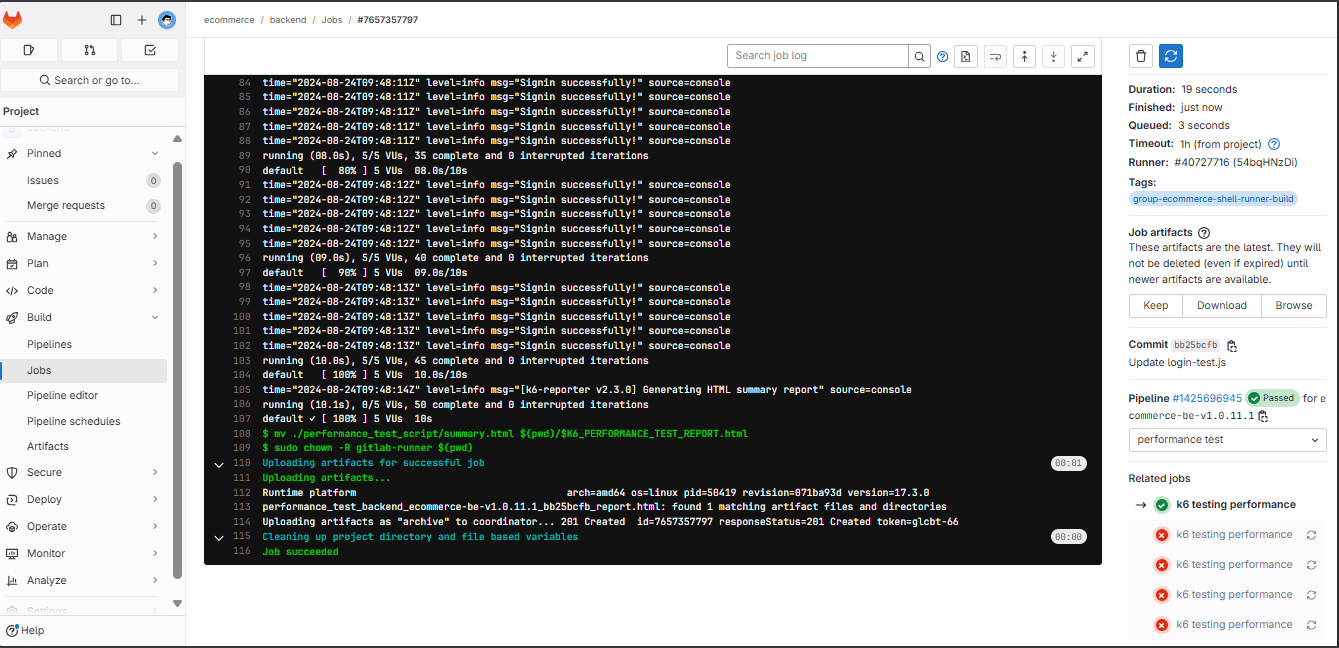
The results of the login test.
